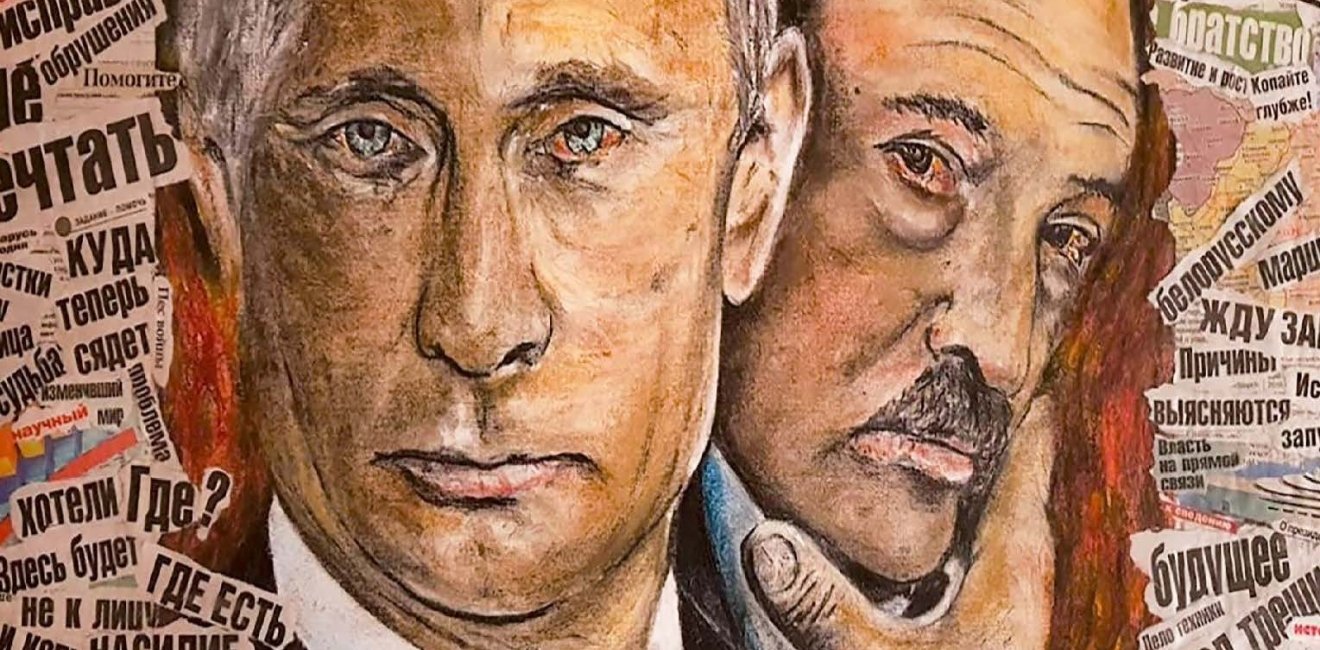
A blog of the Kennan Institute
BY ANDREI BABITSKY
Ukraine is not Russia, and neither is Belarus. Before Russia invaded Ukraine in February, I thought it was obvious and not in need of further examination. It didn't strike me that a person who disagreed with this simple observation and who had an army at his disposal would be willing to bet thousands of lives and the future of his own country just to prove himself right. But failing to proclaim this simple truth—Ukraine is not Russia, and neither is Belarus—loudly, publicly, and often turned out to the wrong decision, and I regret my personal lacking in this respect. If many like me had broadcast it daily, it might have helped avoid this insane war.
I’m not going to talk about Ukraine, as Ukrainians are every day proving their separate, independent existence beyond a reasonable doubt.
But Belarus is another matter. Many people in Russia, in the United States, and in Europe still treat Belarus and Russia as if they were one and the same. And for many refugees from Belarus who fled to Ukraine during the last couple of years, this confusion is not only unfair but dangerous, as they are not considered among the “usual” refugees, who are granted protected status.
So let me elaborate, as the political struggles of Belarus have important moral and political consequences.
I’m a refugee from a country waging a war of aggression. Whatever my attitude, people tend to consider me an accomplice in what’s happening in Ukraine. As a part of the collective entity “Russian people,” I failed to change the government of Russia. To be frank, I didn’t even confront the government with all possible bravery and determination. The same probably applies to most of my compatriots.
Belarus, on the other hand, is a different matter. The people of Belarus did fight.
In summer of 2020 the Belarusian people voted their dictatorial incumbent out. We still don’t know the real numbers, as the election results were completely fraudulent. But the estimates that do exist put the contender, Sviatlana Tsikhanouskaya, at more than 50 percent of the popular vote. And Tsikhanouskaya at the time was literally a no-name, not a politician herself but the interpreter wife of a jailed politician.
If there is such a thing as a stunning election, the citizens of Belarus made it happen. Nothing comparable has ever happened in Russia during Putin’s reign.
One could say that in a dictatorship it’s not enough to win elections, voters are also supposed to defend the results.
Well, they didn’t succeed in Belarus, but at least they tried. Oh, boy, did they try! The protests attracted hundreds of thousands of people in a country whose whole population is smaller than that of Moscow. Protesters refused to leave the streets for weeks, despite growing police violence, detentions, and tortures.
Lukashenka built a torture conveyor in Minsk to scare the protesters. That’s right: the Minsk police built a torture factory in the capital of a European country. And still the protests didn’t fade. In addition to the usual Carbonari, the big-city dwellers, factory workers across the country joined the outpouring of indignation by striking.
This has never happened in Russia, where antigovernment political protest has largely been confined to the streets and squares of the largest cities. And despite the medieval state of the Russian police, the bulk of protesters, at least in Moscow, don’t risk more than a few hours’ detention and a sizable fine—quite a bit short of torture.
The protests in Belarus were crushed eventually, but in order to win, Lukashenka had to betray his country and pledge fealty to Vladimir Putin.
Russia provided the funds for a response, promised an invasion in case the protests succeeded, and thus allowed Lukashenka to secure the loyalty of the police force. Russia arrested and brought to Lukashenka his opponents who had been hiding across the border.
On every moral and practical ground, Belarus is an occupied territory, a Vishy puppet-state to Putin’s Reich.
To make the comparison even more striking, Belarus has mounted real resistance to the occupation.
Even before the war, in the desperate year of 2021, the people of Belarus kept fighting their foe. For example, they broke the world record for displaying the largest national flag—even though the flag they used was banned in Belarus. They kept fighting with style. After the war broke out, some brave people of Belarus sabotaged the railways to cripple the logistics of the Russian army, much as their great-grandparents had sabotaged the railways of German-occupied Belarus during World War II.
We have no reason to believe the opinion polls conducted in dictatorships, as they tend to reinforce the official position, but the indignation of the Belarusian people against the war is so noticeable that even the state can’t twist it into some sort of popular support.
This fact already has had far-reaching consequences. Although Putin uses Belarusian territory to launch rockets, these rockets are most likely launched by Russian servicemen. As of now, Lukashenka has not brought his own manpower into the war.
The Lukashenka regime is a living example of what Putin wants for the occupied territories of Ukraine and elsewhere. It is a puppet state with some discretion as to how exactly it represses its own people, but without an independent policy, foreign or domestic.
Even the very extent of the repression is not up to Lukashenka anymore. Putin’s collaborators are not allowed to spare protesters. That’s part of the deal.
Again, the story has important moral consequences. If Belarus is in fact an occupied country and the citizens of Belarus consider it to be so and despise the collaborators, the words “Lukashenka” and “Belarus” cannot be used interchangeably.
Belarus is not Marshal Petain, Belarus is General de Gaulle. The people of Belarus are actual or potential combatants on the side of the world (not the “free world,” the whole world). And they have, by virtue of voting for it, a decent government of their own, even if this government currently is in exile.
Thousands of Belarusians who fled to Ukraine before the war are sometimes considered aggressors when in fact they are victims of a double occupation.
Whatever the collective responsibility of the Russian people may be, the Belarusians don’t have to automatically share it. Unlike us, they voted the bad guy out. Unlike us, they fought bravely and bitterly to defend their choice. Were it not for us, they would probably even have succeeded.
And even after the brutal repressions they have the courage and stamina to resist the war that is being waged from their land by an occupation force.
These were the moral consequences, but there are political consequences too. There shouldn’t be Western ambassadors “recalled from Minsk,” but there should be ambassadors relocated to Vilnius, where Tsikhanouskaya has her office. International recognition of the government in exile is not only useful, it's the right thing to do.
It helps that Tsikhanouskaya has a political program (published in the wake of the 2020 elections) that roughly consists of two promises: stop political violence and hold free elections. I think pretty much everybody, not only in Belarus, supports this program.
Pretty much nobody, inside or outside Belarus, doubts that the country will be free and independent again. One last small leap of faith is to state the obvious: it already is an independent country, although one that is temporarily occupied.
There can’t be a Russian government in exile, as Russia is not formally occupied; Alexey Navalny is courageously making this point, having returned to Russia from abroad only to be imprisoned. But Belarus has been occupied by Russia, and we cannot even say it was a bloodless occupation.
The world treats the subjects of a dictatorship as though they were the citizens of a democratic country. Even if we Russians did not vote for the crimes of Vladimir Putin, we did let them happen, so at the end of the day it does not matter whether the elections were free and fair. I’m willing to admit that much, with certain reservations.
But if that is the case, we should be honest enough to admit that Belarus has a legitimate government and a flag that the people voted for and fought for, and that their country is occupied by a nuclear power fifteen times larger than Belarus. You can’t have it both ways. If the people of Belarus are supposed to fight for the free and democratic future of their country, let’s recognize their choice.
I’m fed up with my country occupying neighboring lands. Adding insult to injury, so many good people from outside legitimize Russia’s occupation by pretending it did not happen. Three years ago the citizens of Belarus could be blamed for the deeds of Lukashenka. Now they cannot be, as they live in a different country. A country that revolted, and was occupied.
The opinions expressed in this article are those solely of the authors and do not reflect the views of the Kennan Institute.
Author

Journalist; Host of “Snova Nikogda” podcast

Kennan Institute
After more than 50 years as a vital part of the Wilson Center legacy, the Kennan Institute has become an independent think tank. You can find the current website for the Kennan Institute at kennaninstitute.org. Please look for future announcements about partnership activities between the Wilson Center and the Kennan Institute at Wilson Center Press Room. The Kennan Institute is the premier US center for advanced research on Eurasia and the oldest and largest regional program at the Woodrow Wilson International Center for Scholars. The Kennan Institute is committed to improving American understanding of Russia, Ukraine, Central Asia, the South Caucasus, and the surrounding region through research and exchange. Read more

Explore More in The Russia File
Browse The Russia File
Chechnya as a Model of Modern Russia

Russia’s Indigenous Communities and the War in Ukraine

Gas and Power in a Changing US–Russia Relationship

